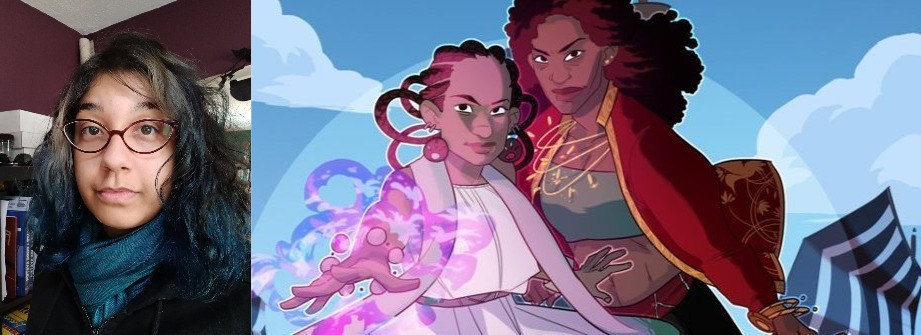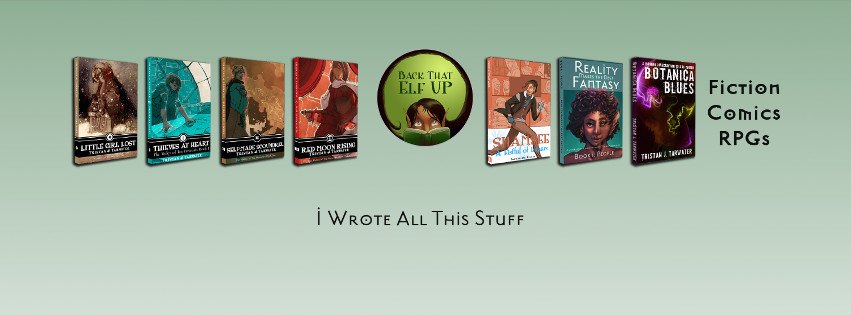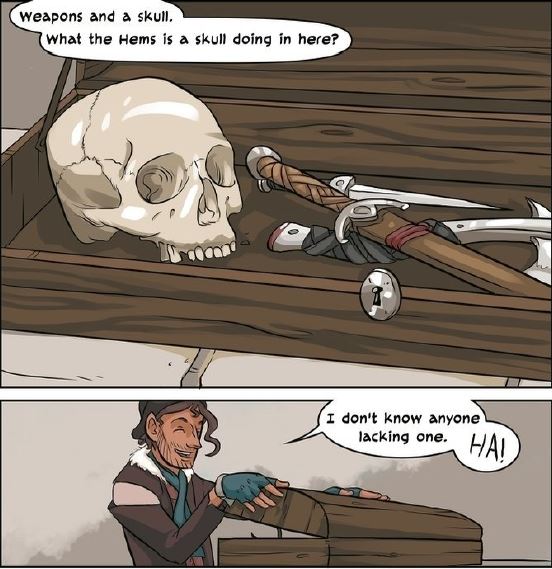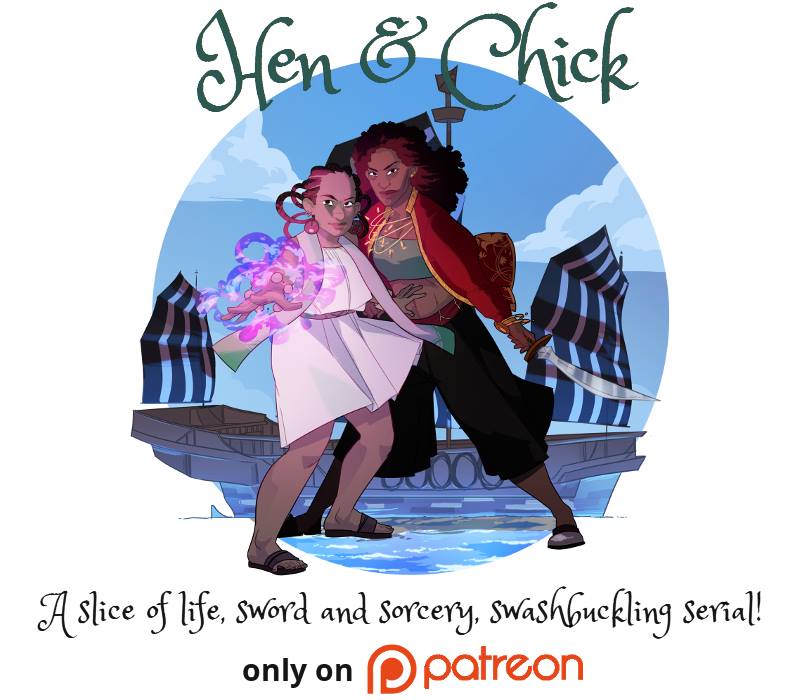Tristan is a writer. Pause. Rewind. Tristan is a Portland, OR based writer of “fantasy, comics and RPG bits” who work has created a fangirl in me. I first became aware of their work through a mutual person on twitter when they were promoting the Kickstarter campaign to Shamsee: A Fistful of Lunars, a comic that they are the writer for, which features a roughish type hero….who always finds himself in and out of trouble. I missed the deadline for the Kickstarter which was successfully funded and bought a print copy afterward. Then I stumbled head first into the rest of their body of work and haven’t regretted it.
I LOVE to read and I also love finding authors, especially folks of color who have diverse characters set in unique worlds crafted with care. (And side note: don’t they have the coolest name ever?! I feel like they are an optional character in a famed RPG game of yesteryear that everyone spent hours obtaining to join their party) Without further ado, here is Tristan J. Tarwater, author of ‘The Valley of Ten Crescents’ series and so much more!
Black Nerd Problems: Origin story time! Can you give us the short version of how you came to be on the path that you are now? Just how did you become Tristan J. Tarwater, the writer? When did you know that you wanted to write?
Tristan J. Tarwater: As a kid, I always loved reading. I grew up in NYC and my mom wasn’t super keen on letting me run around in the streets, so sitting in my room for hours and reading fiction was a perfect pass time for me. My family read to me a lot growing up and as soon as I could read, I’d read whatever I could get my hands on. When I was in 2nd grade we did a book making project and I wrote a story about my little brother. I think from then on, I was like, hey, I can write! It helped that I always had my head in the clouds, ha! I loved mythology and religion and being religious and a person of color in NYC growing up made me consider how rules both cosmic and cultural can really affect people as they try to go about their business.
BNP: I read that Mary Stewart’s Crystal Cave was a book you fell in love with. I’ve never read it but recently reserved it at my local library. In doing that I saw it categorized in the fantasy genre. Personally I feel like I didn’t know about too many female writers of the sci-fi and fantasy genres until I was nearly an adult. Octavia Butler, Diana Wynne Jones, Ursula le Guin among many others were women I started reading and reading about in my late teens heading into adulthood. Did you have a similar experience regarding female writers of these genres? If not, who else were you reading?
Tarwater: I discovered Octavia Butler as an adult, to be honest. I got Dawn: Xenogenesis I in a book swap and couldn’t put it down. I read it in a few days, as I had time. I’ve been meaning to read more titles by her but my reading list is long and to be honest, I read a lot of comics these days.
In retrospect, a lot of the books I adored were written by women. The Egypt Game, jeez, I must have read that book over twenty times and I still count that book as being super influential in my reading and writing as well as my interest in mythology. I read it a few years ago and I still love it. The Animorph books are written by a woman and I read a lot of those as a kid. The Handmaid’s Tale, which I maintain is the scariest book I’ve ever read. Lois Lowry has so many amazing books. I read most of The Dragon Quartet as a teenager. When it came to reading for pleasure, it was probably half and half men and women, to be honest.
Required reading for school though, especially in middle and upper school, skewed towards men as authors and a vast majority of these men were white. I still remember when I found books like The Latino Reader and The Nuyorican Poets Cafe book as a teenager;
finding them was really eye opening and satisfying for me. Those stories definitely weren’t required reading. Books by underrepresented perspectives, very often, were ‘optional’ reading, where there were a few books to choose from, each one from a different underrepresented background.
You’d read one over the summer and spend like ten minutes on it in school the first day, then spend three months on Rime of the Ancient Mariner. Rime of the Ancient Mariner is great, don’t get me wrong but it’s obvious who gets taken more seriously in school and as a kid growing up, I sure as hell noticed which writers were supposedly great and whose history mattered and it is very troubling, to say the least.
BNP: You’ve explained this before in other interviews but would you be so kind as to explain the thought that went behind the creation of the phrase, “Back that Elf Up”? I shamelessly adore puns and can’t let this opportunity go.
Tarwater: Ahaha, totally! So, back in the day when I was first writing about Tavera and her stories, I used to type them out on my little 10 inch Asus netbook. When they were done and kind of proofed, before I would chicken out, I would post them up on an invite only Blogger site. It was called ‘Back That Elf Up’ because over the years, I’ve had so many floppy disks and computers just…you know, die in the middle of something, rendering all my work destroyed. So I put it on Blogger as way to ‘back up’ my work. The ‘Elf’ part comes from my love of elves as characters and obviously, it’s a play on ‘Back That Ass Up.’
BNP: In regards to the #WeNeedDiverseBooks campaign, have you seen anything that has moved you greatly or made you wished you’d seen eons ago?
Tarwater: As a kid, knowing I wasn’t just a snarky little jerk, requesting more representation in school curricula? Wow, that would have probably made me feel better. As an adult, looking back, I realize a lot of the things I noticed as being screwed up and was told to calm down about, I was actually right! Ha!
I love that people are standing up and showing not only are these books being written, these books were written in the past. There’s a history of underrepresented writers and artists creating and now we can stand with them. We can speak for ourselves and find each other and not be alone.
Writing and creating can be really lonely, as can advocacy. Having company means a lot. There are so many great authors I’ve discovered because of #WeNeedDiverseBooks and I love that their work is getting into the hands of readers who are hungry to see themselves and others in what they read.
BNP: As a writer now in a time of social media where folks can use all types of websites and apps to promote themselves and their work have you found this to be more beneficial to you? What are the cons, if any?
Tarwater: As someone who self-publishes, it means I can actually carve out my little camp on the internet and have people pass by. Before Facebook and Twitter…I don’t know how the heck anyone would know I exist. They aren’t perfect platforms for finding readers by any stretch of the imagination but they are still a way to get on people’s radar.
A lot of people don’t realize how hard the hustle is for self-promotion and marketing. There’s a lot of just straight up strategy involved and it’s a lot of work. There’s a lot of media getting made and you have to get on people’s radars and then, hopefully have something they want! I’m really lucky my Spouse is willing to research marketing, and handle a lot of it because it gives me the time to write and plan. Volume of work is also more important than people realize too. You can’t just write one book, especially in genres like fantasy. Social media is an integral part to my marketing but making sure I am always making stuff and publishing is a part of that too.
I’m a big fan of Twitter. I’ve made a lot of friends through Twitter, and a lot of professional contacts, which has obviously helped me on my path to get my work out there. I get to connected with fans and I’ve learned about other creators I really respect and admire. Of course, it can be super distracting. I can get really distracted by social media and if something happens on the telly, I can spend some time just yammering about terrible storytelling or bad character development or crappy trope use. But it’s nice to have, since if I get mad about something, I can vent, if I’m feeling depressed I can hold myself accountable a bit and mention it.
There are other places I should use more to promote my brand and connect with people but there are literally too many. I like Patreon; I get some feedback there and it’s really nice. I don’t think people truly understand how much it makes an author’s day, to get a comment or a review, how much power readers hold! Ha! I mean, people have an idea but I read every review and comment and think about them and honestly, probably overthink them.
BNP: I would be remiss if I didn’t ask about your background in gaming and my absolute favorite genre: RPG’s. I know your fascination with elves comes in partly from exposure to Zelda at a younger age and you used to write a weekly gaming column some of that which is being formatted into books. Do you find the gaming world more frinedly, even more “women friendly” now or have you just carved out a niche for yourself and have hoped for the best?
Tarwater: Video game wise, I’m a really casual game player. I like Animal Crossing and Harvest Moon. I played Kirby games on the old Gameboy and really liked puzzle games. My favorite Pokemon game is Pokemon Snap. I love Neko Atsume. I loved Ocarina of Time but I liked doing the dungeons and puzzles. I used to let my aunt fight the monsters and I would do the running around. We played as a team, and that was a lot of fun for me. I started playing DnD and tabletop RPGs as a young adult, after a long time of hearing things akin to, if you play DnD, you’ll become possessed by the devil and kill yourself. Well, it’s been like, 10 years and I’m still here, getting ready for my Spouse to DM again. I’m really excited to play after a hiatus and because system-wise, I’ve only heard good things about 5E. I might play a cleric, because I’ve never considered playing one before? And I’ll most likely play some kind of elf or a human.
I’m going to state the obvious and say, as far as RPGs being a friendlier place, this is a hard question to answer. In a lot of ways, it is more women friendly because more people are aware of the number of women who play games, want games and design games, and so it’s encouraging to other women who want to do these things.
I don’t have hard numbers but I’d hazard a guess and say more women are in the gaming industry, busting their asses to make great content and amazing games. Good characters are getting made and getting in the spotlight. Gorgeous storytelling is lauded. Because of the internet and social networking, a lot of women are able to connect with each other.
Allies are saying they’re allies, and not in the crappy, LOOK AT HOW GOOD OF AN ALLY I AM kind of way. There’s a lot of women who have been in the gaming business for a while and more are joining the ranks and starting their own companies and people are buying their stuff because it’s good and the marketplace is easier to get into, in the sense there are so many platforms and ways to make games.
But of course, it’s not ‘friendly’ across the board. There’s obviously a lot of harassment to put it extremely lightly, a lot of push back from assholes. But it’s 2015 and thankfully a lot of people are just like, **** it, I’ve had enough, I’m going to make what I want. But I think people are able to brace themselves a bit more for any negative attention hurled their way and a lot of spaces, physical and online are learning how to combat the repercussions of you know, someone getting effed over because they wanted to make a game. More people, more women and other underrepresented people want to create, despite how much other people want to destroy.
As for my work in the gaming world, I do bits here and there. I pick up work when I can, as I have time. I like writing Reality Makes the Best Fantasy because it kind of exists in this nice space in my head, where storytelling and outside stimuli kind of coincide. I wouldn’t call RmtBF a niche more than like, a title I have and it’s like, a tiny spot in this sea of work, in my own little bubble and the huge ocean that is all RPG creativity. I love playing RPGs more than writing them, but I’m hoping to have a world book out that includes The Valley of Ten Crescents and Miz at some point. You know, another thing on the list, heh.
BNP: Your latest project is a fiction project titled Hen and Chick which you describe as an “a slice of life, sword and sorcery, swashbuckling, serial adventure”. It follows the story of a young teenage mage Azria who reunites with her mother who is a captain of a ship…or a pirate. Either way grand adventures await them and I can’t wait for the next installment.
This project is a new venture for you have been hosting on Patreon, a unique website that I’ve just recently become hip to where people can pay monthly to supports artists of all different kinds in long term projects that need funding but don’t fit the model that Indiegogo or Kickstarter are used for.
Lastly, What else can you tell you tell us about this new project, what are your goals here? What do you want people to know about Hen and Chick which looks like it will be a story about a mother and daughter bonding (which I feel is rare!) on the high seas?
Tarwater: I really wanted to do a new series alongside The Valley of Ten Crescents and I had Miz kind of simmering in my head as a place I wanted to work with; I’ve had the map for a few years in a notebook, kind of just waiting for me to get an idea. A tropical island adventure with magic and warm sand and sparkling water and sword fights? I am a big fan of the Ong Bak trilogy and Pirates of Dark Water so that definitely kind of skated along the idea for Miz.
For Azria’s story, Hen and Chick, it’s kind of a coming-of-age tale, like Thieves at Heart. Tavera grows up during Thieves at Heart but Azria is a teenager, at that age where adults treat you like a fellow adult at their convenience. I like telling tales about people developing their moral codes and their selves, in opposition and in conjunction with the societies and cultures they live in and encounter.
And I wanted to tell a mother-daughter story because I don’t see them a lot. There are so many dead moms in fiction, especially fantasy fiction! And a lot of crappy step mothers. Dead moms are one of those easy outs as to why a character is messed up or sad, with no regard to the mothers themselves and how screwed up that is, as a portrayal of children from single family households.
Families come in all kinds of make ups and there are a lot of parents out there who have to make hard decisions as to who is going to help them raise their children and how they’ll provide for them. I know a lot of families where when one of the parents left, it was better for everyone and I wanted to show a family that’s made some tough decisions about who would be around and who wouldn’t and what that means, how they work together, all that and more.
Azria is a mage and trained in the art of magic but she still has a lot to learn about herself and what it means, that she’s a mage, as well as continue her studies on her own. The type of magic she performs is of Miz but it’s still her magic and her choice as to how she uses it. She has to learn really quickly about all the different kinds of people who exist in the world and who her mom actually is. And of course, Azria is still learning how she fits into the world and what she wants, what she expects from herself. If I can tell a character driven story where people are invested in the people and the world, and if I can deliver on time? I’ll be very happy. I like Azria and Apzana and the rest of the crew. And if I can get people interested in my other work, that’d be rad as well. I have a lot of stories to tell, a lot of relationships to blow up, yah know? Ha!
_____________________________________________________________________________________________________________________
And there you have it, folks! From the mouth of the incredible writer themself, be sure to check out Tristan’s page on Patreon and support Hen and Chick as it updates monthly. While you’re at it take a look at Shamsee, the comic that they’re a writer for, that I mentioned earlier on in the intro.
Want to get Black Nerd Problems updates sent directly to you? Sign up here.
Follow us on Twitter, Facebook and Instagram.
Editor’s Note: This interview was first published on May 22, 2015. The interview, since then has been updated and now includes the writer’s newer pronouns that they prefer and answer to. All Kickstarter campaigns mentioned have long finished their days of seeking funding and Tarwater’s Patreon is currently not active. See more of Tarwater online of their website where a complete listing of their work is linked for purchase and find them on Twitter. They contributed to several projects since this interview wrapped up like penning comics about Harriet Tubman featured on The Nib.








Show Comments